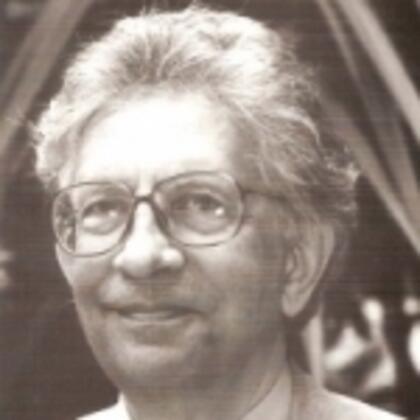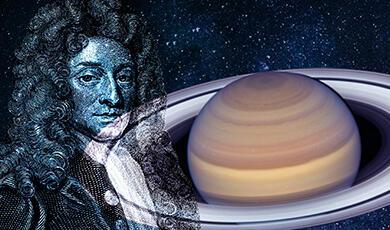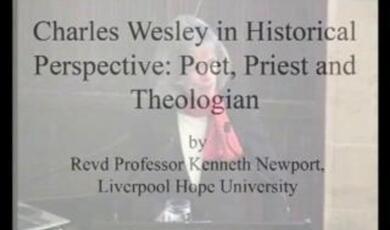How might we survive death?
Share
- Details
- Transcript
- Audio
- Downloads
- Extra Reading
Would you be willing to avoid the rush hour this evening by being sent home by tele-transportation? All the details of your structure, including the neural basis of your memories and personality, would be beamed into a waiting soup of matter, to replace your earlier body. Your friends would notice no difference. Are you afraid that it wouldn't be you? If so, do you think some of your present body needs to be preserved, if you are to survive death? Or do you agree with those who think that you wouldn't need any body at all? We shall consider what might be possible.
Download Transcript
MORTAL QUESTIONS
How might we survive death?
Professor Richard Sorabji
The earliest written suggestion in Western writing that we might be annihilated at death is said to be on the inscription for those who fell at the battle of Potidaea in Greece in 432 BC. For hundreds of years before that, the Homeric bards had been singing of at least a shadowy after-life. Not that a Homeric after-life would comfort everybody. It was pretty gloomy, with a very dimmed form of consciousness, and it allowed for punishment of the wicked. The possibility of annihilation is not necessarily what people fear about death. They may rather fear illness or pain, or the interruption of their projects and relationships, or subsequent punishment. Indeed, around 300 BC, the philosopher Epicurus sought to remove the fear of punishment after death by saying that we need not worry, because we were a bunch of atoms and would have disintegrated. Plutarch, the Platonist, had to respond to him that disintegration was exactly what other people feared. But perhaps only 50 per cent of a Western audience is like to be horrified at the thought of annihilation. In India , the proportion is much less, because so many people believe that they will be reincarnated, even if only as animals. It is the fear of annihilation that I will consider and the ways in which it might be avoided.
Reincarnation
One way of surviving is thought to be reincarnation, rebirth in a different body. This belief is partly concerned with moral responsibility. Your present woes are due to sins in a past incarnation and your present sins will bring woes in a future one. It may not often be used to assuage the fear of annihilation, because, on one view, annihilation is to be desired, whereas reincarnation guarantees the renewal of woes. But if someone finds the idea of reincarnation horrifying, should belief in reincarnation provide reassurance?
James Boswell, the biographer of Dr Johnson, was someone afraid of annihilation. Suppose that somebody attending today’s talk is the reincarnation of Boswell. Should Boswell have been cheered up on his death bed by reflecting that before long you would be born? Surely, that would be no help, since you are different persons. Perhaps the idea is that you share the same soul, and I shall come to the subject of souls shortly. But if this is just a case of different persons sharing the same soul, Boswell will not have got what he wants, which is that he, the same person, should survive, not merely a soul with multi-ownership.
Disembodied survival
Another remedy suggested is that we might survive without bodies. Can we perhaps imagine this? Suppose that as you sit alone in your room, you notice your foot seems to be disappearing from view and that you cannot feel it either. Gradually the disappearance spreads up your legs, and then the rest of your body, leaving your clothes a crumpled heap. Last to go is your voice, and then you could no longer have any direct effect on what was going on. But would you have ceased to exist, or would you not rather be surveying in helpless horror the scene which you had vacated?
There are two sorts of problems about this kind of scenario. One is the question of what sort of activities would be left to you that did not require a body as something built into the very idea of engaging in that sort of activity. I suggested that you could not have an effect on what was going on, put on your coat, for example, and summon help, but you might stillsee. Such seeing would not be of a kind known to Science, since you would not have any receptors capable of receiving light rays. But we are asking what might be possible beyond what is known to Science. Might not the experience be the same as that of ordinary vision, and equally informative? The experience of seeing involves a point of view, with things seen as being to the right or left, nearer or further away. This experience can be imagined as continuing, so that even though you no longer had a body occupying space, your visual experience would be as from a sizeless point in space. But as the scene before you seemed to shift, would this be a case of your gaining information about what was happening next door, or merely imagining it? Normally you know that you have gone next door because you have had the expected muscular sensations throughout your limbs of moving there. But in the new circumstances, sensations could not be felt over an extended area, because, with your loss of body, you could not be thought of as spread out over a whole area, even if there was a sizeless point from which you were viewing things. The normal sensations of touch would therefore not be available. To confirm that you had really moved to view next door, you might try relying not on your tactual experience of moving next door, but on the testimony of other people who were still embodied about what was happening next door. But how would you communicate with other people? I have already supposed that your voice would go. But could you both hear others and cause them to hear sounds like that of your voice by means not known to science?
I hope I have said enough to indicate that even something as straightforward as seeing, let alone feeling, could be problematic. And it is no accident that in the 4th century BC, Plato in the Phaedo makes Socrates suppose that when disembodied after his execution what he will principally be doing is thinking, and also enjoying his thoughts. Indeed it is said to be part of the importance of Philosophy that it prepares you for death, by occupying you with thinking, not with the seeing and feeling that is so dependent on a body. Of course, Science tells us that thinking also depends on the brain, but again we are asking what can be considered possible beyond the knowledge of science. And it is not to the same extent true that the very idea of thinking involves operations conducted over an area of space in the way that feeling does.
Plato was followed by many Christians. Even though they believed that we will be resurrected with a body, many of them felt that the appropriate, even if not the inevitable, occupation for the next life would be one of contemplation. At the end of the 4th century AD, Saint Augustine is torn in his Confessions, because he describes the bleak loss he felt when a friend of his youth died, and hopes the friend will still remember him. And he describes the mystical experience he shared with his beloved mother a week before her death, in which he felt they had momentarily become aware of God in the way in which the Saints might uninterruptedly contemplate him. Yet in the same work, his official view is that there will be no genetic relationships after death, however much he may have loved his mother. Christ himself said that in heaven there would be no marriage, nor giving in marriage. And the occupants of what he calls the heaven of heaven will not after all remember their past friends, because thoughts of past and future will be replaced by being rapt in contemplation of God. Another fourth century Christian, Gregory of Nyssa, says that this would be endlessly fascinating, because there would be an infinite amount to find out about God.
The Christian ascetics living in solitude in the desert earlier in the same century had pushed human possibilities to the limit, in trying to get rid of all emotion. Although Augustine disapproved of this, they too felt that in doing so they were coming closer to the state suited to the next life. What I am suggesting is that a disembodied after-life might require you to prepare yourself for a life with very different activities from those of the one we know. The ways in which friendships could be renewed and pursued would be very different. The thinkers I have mentioned considered this desirable. Disembodiment might make it inevitable.
There is a second problem in the idea of disembodied survival. I have been asking what kind of activities would be available in the absence of a body. But there is also the question what kind of enduring subject we can imagine as being the owner of these activities. Sometimes people talk of our soul. But what sort of thing is our soul? For Plato’s pupil, Aristotle, soul was just the life-manifesting capacities of a body with organs, the capacity to think, perceive, desire, and use food to maintain physical structure. But then he drew the inevitable conclusion, that that sort of soul, capacities of a body, could not possibly survive after death. We may instead think of our soul as the psychological aspect of our embodied selves. But anaspect is not the sort of thing that could own thoughts and experiences separately from the embodied person or other thing of which it is an aspect. Perhaps the idea is rather that what endures is the person who was initially embodied, but is later disembodied. Such a view is expressed by the Islamic medieval philosopher Avicenna, who thinks that a body is inevitable initially to give us our identities, but that we do not depend on its continuing, and indeed that it is not part of the idea of soul or self that it should be always embodied. I can now make clearer the second problem about ownership.
Suppose a disembodied thought occurs and a disembodied perception. To whom do these experiences belong? Perhaps to two different disembodied owners, perhaps even to two who exist only momentarily. But we want to be able to say that some experiences belong to us. What would connect the experiences with one of us, rather than with another disembodied owner? Well, there might be a thought responding to an earlier thought that had occurred uniquely to one of us when we were embodied, and to no one else. Or, if flavours can be experienced at all, a flavour might, in Proustian fashion, cause an experience of reliving an episode that had uniquely befallen one of us, when embodied, and not happened to anyone else. Provided that there are one or two experiences, like this that are connected with a unique aspect of our embodied past, other experiences can be tied into the same history, for example by being causally connected to it, as the new experience of the familiar flavour is causally connected to the reliving of the original tasting. This is rather a clumsy way of going about things. If we start with embodied people, there is no question about who owns an experience. But if we start from the opposite end with experiences and try to assign them to a disembodied owner, we have to see if an owner can be constructed out of a network of interrelated experiences. The embodied person has become such a network. Perhaps there are such networks, although there may well be many experiences too isolated to fit into one network rather than another. If so, the number of experiences that belong firmly in the history of one of us will be much reduced. And I am not sure how encouraged we would feel at the thought of our departed friends now existing only as networks. But provided the networks somehow communicated with each other, they would presumably not think of each other as being reduced to networks, even if that is what they were. If the networks included wants and wishes, they would think of each other as wanting and wishing, not as networks including wants and wishes.
So far I have not said that disembodied survival would be impossible, as many philosophers nowadays would say. Rather, I have only drawn attention to the limited number and very different range of experiences which it could be expected to include, and the very different conception we would have to have of a person, if persons turned into networks. If disembodied survival did not include friendships of the kind we are used to, it would seem to many people unattractive. Let us then consider instead a final possibility, which is in fact the possibility endorsed by ancient Christianity, that of resurrection with a body.
Resurrection
Resurrection with a body, like disembodied survival, is not something expected by Science. Resurrection is thought to depend on a God, who is both benevolent and thinks us important. It is one of the striking features of Christianity that we are told that every hair of our head is numbered. If there is a God who cares about our individuality so much, that would for many people be very comforting. It was, of course, easier for those who accepted Plato and Aristotle to think of ourselves as being important. Although Plato and Aristotle did not believe that every hair of our head was numbered, they did think that the earth was at the centre of the universe, and that humans were the most important species, not merely a product of evolution eventually to be superseded in its turn. They both knew of rival views. The ancient atomists had said that earth was merely a speck in an infinite sea of worlds. And other predecessors had proposed theories of evolution and natural selection, which Plato and Aristotle consciously rejected. Plato even went so far as to reverse the evolution of humans out of apes. Rather, he suggested, animals evolved out of humans, but not by natural selection; rather by natural de-selection. Animals were the reincarnations of humans who had led animal-like lives.
The idea of resurrection eliminates the problems we have been looking at. The familiar range of experiences would be available to embodied persons, if that was thought appropriate, and there would be no puzzle about what kind of owner the experiences could belong to. The early Christian thinkers did not yet introduce the complication that we find in the 13th century in Thomas Aquinas of an interim period of disembodiment after death and before the bodily resurrection. The standard Christian view was that in the resurrection we would be given back our own bodies, and that for this purpose, some of the original matter would need to be preserved and reassembled by God. Thomas Aquinas says that we would not need accidental matter like hair and nails to be preserved, only the essential matter need be preserved.
But this idea had run into a problem of its own as early as the late 2nd century AD. The Christian thinker Athenagoras already knew of the objection that we are part of a food chain. After our death, our bodies will be eaten by a series of creatures some of whom, further along the chain, will be eaten by other humans. Since these later humans will share our matter, how will there be enough matter for us all to be resurrected with our original matter, or as Thomas Aquinas was to say, with our essential matter, meaning that at least the inessential matter could be surrendered? The optimistic answer of Athenagoras, that human flesh is not assimilable as food, will not be believed nowadays. The food chain version of the problem is more worrying than the dramatic version that was sometimes discussed, about which of you would be resurrected, if a cannibal ate you. The food chain affects us all; only a few will be eaten by cannibals.
A very brilliant Christian of the 3rd century AD, Origen, had a solution. Resurrection requires not that we should have any of the same matter, but merely that we should have a body of exactly similar structure, apart from blemishes. Indeed, the matter would not be the same, since instead of flesh, we would have bodies made of pneuma, a mixture of air and fire. It was pointed out by a supporter of Origen that the Book of Isaiah in what Christians call the Old Testament speaks of a new heaven and a new earth, so we should not expect the matter to be the same. In Aristotelian terminology, Origen said that we should expect a body of the same form, not the same matter. On either view, whether same matter or same form, Christians had to consider whether one would have the same matter or form as at twenty or at 50 years of age. Thomas Aquinas, who took the orthodox ‘same matter’ view, postulated the same matter as one had in one’s prime, assuming one reached one’s prime. We might think of the photograph which one would choose to commemorate someone as representing the ideal age for replication.
So far, Origen’s ‘same form’ solution does seem to cut through many of the problems. But Origen made a concession which was leapt on by his later opponent the Bishop Methodius. Origen said that we would not need the same organs in the next life, teeth stomachs, hands and feet. This seems a very sensible thing to say, if, as many Christians believed, the next life should be very different from this one. Augustine was disgusted by the idea that we might eat. Origen himself drew attention to Christ’s saying that in heaven there will be no marriage nor giving in marriage, and Origen added that we would not even remember our spouses. That would surely already be an enormous difference. But if that makes it sensible to say that we will not have the same sort of organs, how could our bodies have the same structure or form? That was Methodius’ triumphant question. Indeed, sensible as Origen’s concession was about not having the same organs, it would be safer for him to retract it, if it can plausibly be retracted.
Modern Philosophy
I now come to what has been said in modern Philosophy about this kind of situation, and I will focus on a very interesting book called Reasons and Persons by the philosopher Derek Parfit. Parfit himself is very hostile to belief in God, and even claims, although I do not think that this is historically the case, that it has hitherto impeded the development of Ethics. His examples are conscientiously drawn from science fiction, instead of from Theology. But one thing I want to say is that this makes little difference, since a good philosophical imagination may come up with very much the same issues, whether it is that of a Christian theologian like Origen, or that of an atheist.
Let me now put to you one of Parfit’s interesting questions. Suppose you want to travel to Mars. You can use the conventional method, which involves some risk and considerable delay, of travelling by rocket. Alternatively, you can travel at the speed of light by being tele-transported, a method made famous by the fictional television series, Star Trek, in which the hero would say, ‘Beam me up, Scottie’. The idea is that, at the speed of light, a computer could transmit all the information about your body and brain needed to reconstruct you, with all your bodily-based psychological characteristics, in a pile of matter on Mars. Of course, we should need conscientiously to destroy the body left behind on Earth, so that there would not be two of you. When you had finished seeing Mars, you could be tele-transported back without delay, and when you got home, your partner and family would be entirely satisfied that it was you. There would be no detectable difference. Are you too satisfied that it would be you, or do you have a nagging feeling that it might merely be someone exactly like you? Parfit engagingly admits that he would feel nervous, but he thinks that that is irrational, and he says that he would press the green button and have himself tele-transported, if he wanted to go to Mars. I wonder which of those hearing or reading this talk would press the green button. If you would not, and not merely because of the risks of malfunctioning, since there are risks in either method of getting to Mars, perhaps you should reconsider the attractions of Origen’s ‘same form’ resurrection. For in many ways it is parallel. With Origen’s scenario too, there is room for the nagging worry, ‘Would the person with the exactly similar body and related psychology be me, or merely someone exactly like me?’
If you feel this worry, you should probably think the orthodox Christian view the preferable one of the two, if it is a possible view, that resurrection would require the restoration not merely of the same bodily form, but of some of the same matter, at least the same essential matter, whatever that might be. This thought is what made Christians in some periods very careful about burial practices. In one of the periods of the Roman Empire , Christians did permit cremation, but preserved their forefinger for burial. I don’t know if the forefinger could be regarded as essential matter. Nowadays, people might be more likely to think of their brain as essential.
The preservation of essential matter is like another scenario that Parfit describes. When your body is ageing, would you like it if your brain could be transplanted into a youthful body reasonably like your own younger body? Provided the brain carried with it your psychological characteristics, the resulting person, it seems, would be you, and this would provide a method for rejuvenation. Parfit even imagines that half your brain might be enough to do the trick. So far, so good, it may seem.
But now Parfit asks what would happen, if the other half of your brain was transplanted into another youthful body with equal success. Would there then be two of you? There could not be two people identical with your former self, because of what we mean by identity. The two new people would not be identical with each other, because they would be in different places with different experiences at the same time. As time went on, they would diverge more and more from each other. Because of what we mean by identity, they could not therefore both be identical with your former self. Yet it would be arbitrary, given their equal claims, to say that one was identical with your former self, and the other not.
We now have a very funny situation. Suddenly there is no one left who is identical with your former self, so you have now perished, even though, before the second transplant, it seemed that you, the self-same person, was happily continuing in a youthful body. Moreover, if only the second transplant had failed, it seems you would still be happily continuing. The operation was performed on someone else and need not have had any causal effect on you at all - you need not even have known about it. How, then, can it be that what is done to someone other than you has of itself brought about your demise? I believe a similar question was asked in antiquity by the Stoics about another imaginary operation, an amputation, but I will leave that to another time. Parfit, following Bernard Williams, says that such dependence on what happens to someone else is impossible, and he concludes it is better to suppose that even the recipient of the first transplant should not have been thought of as identical with yourself. In that case, your identity ceased at the time of the first transplant.
Does that have implications for the orthodox Christian view of resurrection? Does it mean that if God transplants your essential matter into an otherwise new body, your identity is lost at the very moment when it was supposed to be secured? But the orthodox Christian theory is not that God transplants your essential matter into a new body, but that he reassembles it. There is no setting aside of some essential matter for subsequent transplants. So the same problem does not arise.
Parfit’s own solution is that we do not need identity. Even without identity, you could be said, in some sense, to survive in both of the two beneficiaries of transplant. I do not think this is a very strong sense of ‘survive’. It is rather the sense in which one might be said to ‘survive’ in one’s heirs, or in those who carry on one’s life work. This would not be enough to assuage the sense of horror which I have been seeking to address at the thought of one’s own annihilation. But Parfit would be happy at the survival being only in a weak sense. For his overall conclusion is that we would be less anxious for ‘ourselves’, and less ‘selfish’ towards ‘others’, if we realised that the idea of a continuing self in any strong sense is an illusion, and that ideas of anxiety for self and putting self before others are based on an illusion. All we really have is various degrees of psychological linkage between earlier and later. He welcomes the fact that Buddhism has produced a partly similar view.
Parfit goes further still. He thinks that if you believe in a continuing self, you must be committed to Descartes’ theory that we have an immaterial ego. With this I do not agree. I think we need have no theory in order to see the world in terms of ‘me’ and ‘me again’, and that it is essential for infants that they should see the world that way. If they could not see the world in terms of ‘me getting back’ to a safe place or ‘me not going back’ to a dangerous place, they would not survive through their infancy. Of course, if the world began to behave very differently, so that Parfit’s multiple transplants became commonplace, we should have to think differently, e.g. in terms of ‘us’ not getting back to a dangerous place. But for now, we use the idea of ‘me’, without committing ourselves to Descartes’ heavily metaphysical idea of an immaterial ego.
My conclusion is that the Christian belief in resurrection would provide the must attractive kind of after-life. But it would depend on supernatural agency, and it faces major difficulties, whether we take Origen’s version of the belief, or the orthodox version. On Origen’s version, we have the nagging feeling that the survivor might merely be someone exactly like us. On the orthodox version, we have the second century problem of the food chain not leaving us enough essential matter.
In later weeks, I shall ask whether survival of a different sort might be provided by natural, instead of supernatural means, if time went round in a circle. And I shall also ask whether it is irrational to feel horror at the thought of not continuing to exist, and whether this represents a confusion.
© Richard Sorabji
This event was on Thu, 14 Nov 2002
Support Gresham
Gresham College has offered an outstanding education to the public free of charge for over 400 years. Today, Gresham plays an important role in fostering a love of learning and a greater understanding of ourselves and the world around us. Your donation will help to widen our reach and to broaden our audience, allowing more people to benefit from a high-quality education from some of the brightest minds.


 Login
Login






